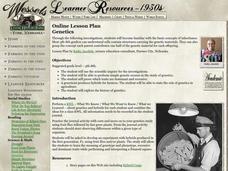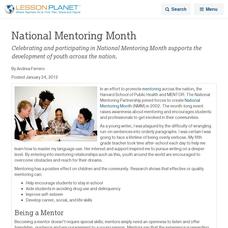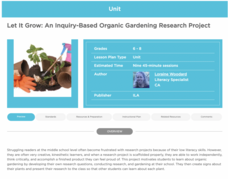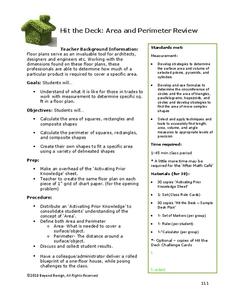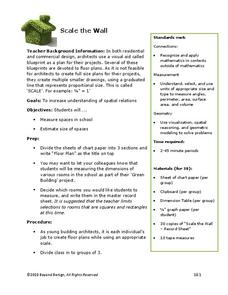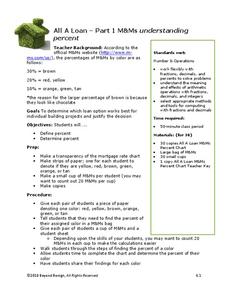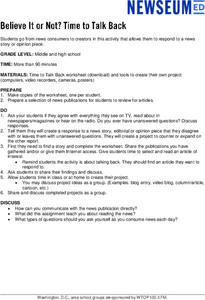Curated OER
Genetics
Become familiar with the basic concepts of inheritance. Your junior high students work through mulitple examples of crosses and calculate probabilities of trait occurance. The explain the concept that each parent contributes one half of...
Curated OER
Traders of the Lost Art
Learners work in small groups to investigate a variety of art and architecture forms common during the Old Kingdom epoch in Ancient Egypt. Learners then evaluate how these art forms reflect a culture's beliefs and values. And, finally,...
Curated OER
Ocean Careers Exploration
Learners will work together in groups to gather information about careers in oceanography. They discover the need to have a diverse group of people on a team and then share their information with the class. Web links and materials are...
Curated OER
National Mentoring Month
Celebrating and participating in National Mentoring Month supports the development of youth across the nation.
Newseum
You Can’t Say That: Right to Know vs. Security Risk
Print or block? That is the question young journalists debate as part of their study of the freedom of the press. Half the class represents the journalists' legal team, and the other half represents the government's legal team. Teams...
ReadWriteThink
Let It Grow: An Inquiry-Based Organic Gardening Research Project
How does your garden grow? An inquiry-based, organic gardening unit asks young scientists to research a vegetable or flower, create an environment for it, and then plant and tend to the seedling. Gardeners develop their own research...
Beyond Benign
Build-A-Math
We can't build our dream house yet, but we can definitely build a model. Scholars use floor plans to build models of their dream homes. Cardboard is as good as any material for this purpose.
Beyond Benign
Final Budget
Be sure you have enough money to build a house. The 14th lesson in a 15-part series teaches young learners to use checkbook registers. They write checks for the amounts they spend on various housing materials and keep track of spending...
Beyond Benign
Green House?
A solid foundation is important for all things—especially houses. Learners research different materials for foundations based on environmental impact and cost. They decide whether concrete, insulated concrete, or wood would be best for...
Beyond Benign
Hit the Deck: Area and Perimeter Review
Designing a deck sure demands a lot of math. Future engineers and architects learn about the areas and perimeters of squares, rectangles, triangles, and composite figures. They apply their new knowledge to design a deck with a specified...
Beyond Benign
Decision Graphic Introduction
E is for economics, environment, and social equity. The fifth installment of a 15-part series has scholars first considering ecological impacts, such as determining how much water it takes to produce a can of soda. They then use decision...
Beyond Benign
Scale the Wall
How can you fit an entire school on one sheet of paper? You use scale! Scholars measure rooms in the school and, using the correct scale, design a floor plan that includes area calculations with their data.
Beyond Benign
The Final Floor
Finally, the final floor plan. The 11th installment of a 15-part series looks at floor plans for houses. Scholars try their hand at creating a scale drawing for the floor plan of their dream houses.
Beyond Benign
All A Loan
When designing a house, it's important to know about percents. Through a series of three lessons, scholars first review percentages through an activity involving M&Ms and then apply that knowledge to calculate compound interest and...
Beyond Benign
Drafting Bubbles
Let's start designing a house. Future architects create floor plans for a house given certain constraints. They calculate the area of each room in the house. This is the 11th lesson in a 15-part unit.
Beyond Benign
House Project Overview
What does your perfect house look like? Pupils design a sustainable house given certain specifications. They create concept maps that detail the math skills they need to use while considering their designs.
Beyond Benign
Whose House Is It?
The rich and famous sure have interesting houses. The first installment of a 15-part series has scholars look at provided images of houses in an attempt to match them to their owners. They then generate of a list of features important to...
Newseum
Civil War: Encoding the News
Young journalists learn to appreciate the advantages of how modern media technology enables rapid news delivery as they compare today's media revolution to how the telegraph and Morse Code revolutionized news coverage during the Civil...
Newseum
Covering a Catastrophe: Press Conference Simulation
Young journalists have an opportunity to experience the challenges of covering a catastrophe by staging a mock press conference. Half the class acts as reporters while the others act as officials from the mayor's office.
Newseum
Photo Ethics: News Independence
Young journalists read a case study about an annual school tradition of a streaker running across the football field after the homecoming game. Small groups then decide whether or not to cover the story and whether or not to include a...
Newseum
News About My Community
After researching statistics about their community in local census reports, young journalists interview a resident about their interests and then analyze a local newspaper or homepage to see how similar the stories are to the residents'...
Newseum
Believe It or Not? Time to Talk Back
Young journalists select a news story, editorial, or opinion piece that they disagree with or one that leaves them with questions. They then create their report in response and share it with the class.
Newseum
Am I Being Fair?
Young journalists use four strategies from an "Am I Being Fair?" tip sheet to check for and counter personal biases about a topic. Scholars apply the strategies to an article about the best pizza as guided practice. Participants then...
Newseum
When Tragedy Hits — Role-Playing a Breaking News Story
Young journalists engage in a role-playing exercise that asks them to consider the journalism and ethical issues raised by the coverage of the mass shootings at Virginia Tech on April 16, 2007. Pupils play the role of either a reporter...


